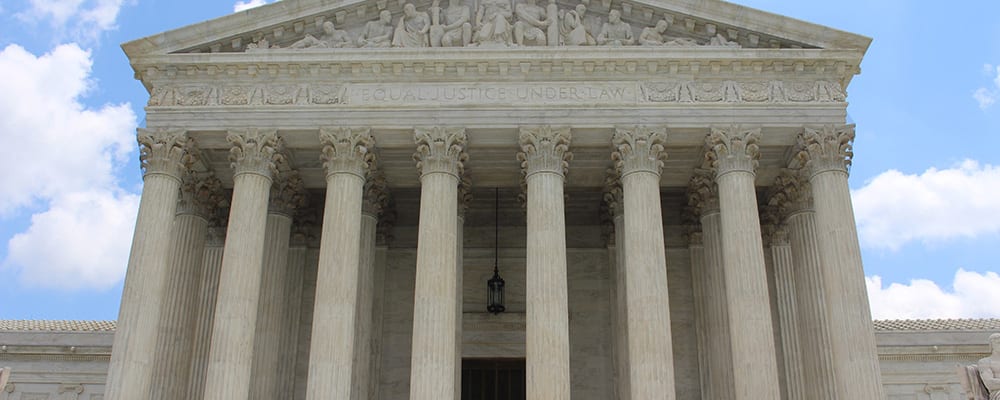Often controversial and famous Supreme Court cases result in new interpretations of existing law or a new legal concept altogether, and that’s why landmark cases are such a big part of history and understanding the way the current legal system is shaped.
In the United States, the Supreme Court handles mostly important court cases, so controversial decisions impact the shape of the country’s history. The laws that impact us in everyday life are heavily impacted by the powers that be – the Supreme Court. Let’s take a look at some of the most controversial and famous cases of all time.
- Bush v. Gore
With just 537 votes separating the George W. Bush and Albert Gore from their claim to the presidency, the Supreme Court made the decision for one of the closest presidential elections in history. Since the votes were so close, a machine recount would be due to take place under Florida law, but there was a lot of controversy on the design of the ballots confusing voters, and suspicions on machines miscounting any incorrectly filled ballots. This led to the Florida Supreme Court to order manual recounts, which was swiftly halted by the U.S Supreme Court the following day under the notion that the order by Florida Supreme Court was invalid due to differing recount methods across various counties violating the Equal Protection Clause of the Fourth Amendment. As a resolve, it was ruled that the original results would stand, naming George W. Bush as the new President of the United States.
- Miranda v. Arizona
What is now known as the Miranda rights, the court ordered that the police had to follow specific procedures in order to protect the criminals Fifth Amendment privilege against self-incrimination. These rights included the right to remain silent, that anything they said could be used against them, and the right to an attorney. If these rights were not provided, the court deemed that any statements made under interrogation by the criminal would be void. This was a landmark case that has had a significant impact on how American law enforcement operates to this day. It was a controversial Supreme Court case at the time, and the decision reversed the conviction of Ernesto Miranda, accused of kidnapping and rape charges in Arizona. He had confessed to these crimes under interrogation without being warned of his rights.
- Roe Wade
This is still considered one of the most controversial cases in history. It divided the country between those who believed in the right to live for an unborn child and those who believed in the rights of a woman to make that choice. Under the alias of Jane Roe, Norma McCorvey was a single mother in the early 1970s. She was pregnant for the third time and did not wish to keep her unborn child. She went on to have her child and give it up for adoption as the Texas law did not allow for her to choose to abort her child. In 1973 however, as a result of her case, the U.S. Supreme Court ruled that the constitutional rights to privacy applied to each woman’s choice too have an abortion. This meant that the rights of women nationwide allowed them to terminate unborn children, thereby legalizing medical practices to make way for the necessary procedures. The right to abortion has been consistently challenged since the 1973 ruling.
- Brown v. Board of Education
In 1954, the Supreme Court declared laws that determined separate schools for black and white students to be unconstitutional, and that it was disadvantageous for minorities. This case was a big part of the start to civil rights movement which eventually led to the integration of the two races and had a tremendous impact on society and the education system. This controversial decision did not sit well and caused issues for a number of years even after being passed. In 1957, Arkansas Governor Orval Faubus blocked nine black students from entering a high school. Likewise, in 1963, almost ten years on from the Supreme Court’s declaration of integration, Alabama Governor George Wallace blocked two black students from enrolling into the University of Alabama. Both incidents were resolved with the intervention of the appropriate presidents at the time.
- Marbury v. Madison
The Marbury v. Madison case allowed the Supreme Court to have the right to declare a law unconstitutional over Congress. John Adams attempted to handicap the administration of President-elect Thomas Jefferson but failed because Adams new Secretary of State did not deliver all appointee’s commissions, and Jefferson ordered his own Secretary of State not to deliver any remaining notices, meaning employees were not able to assume the new positions that they had been assigned. One of these appointees was incredibly frustrated and involved the Supreme Court to attempt to force Jefferson’s Secretary of State to deliver his commission. The Supreme Court unanimously decided that there was no requirement to deliver the commission as the law conflicted with the Constitution. On this bases, Adams’ secretary argued that the law in question – the Judiciary Act of 1789 – was unconstitutional and void. This case paved the way for judicial review.













